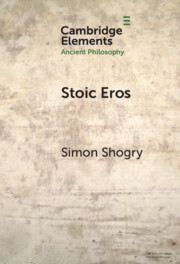I examine the significance of the Stoic theory of pathē (and related topics) for Kant’s moral psychology, arguing against the received view that systematic differences block the possibility of Kant’s drawing anything more than rhetoric from his Stoic sources. More particularly, I take on the chronically underexamined assumption that Kant is committed to a psychological dualism in the tradition of Plato and Aristotle, positing distinct rational and nonrational elements of human mentality. By contrast, Stoics take the mentality of an adult human being to be rational through and through, while recognising that this rationality is not normally in a state of health or excellence. I show how Kant’s account of affections—chiefly the “affects” and “passions” that he identifies as targets of a duty of apathy—draws substantive lessons from his Stoic sources, and how he accepts on his own terms the monistic principles of Stoic moral psychology.
